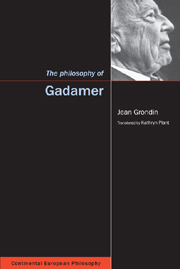Book contents
- Frontmatter
- Contents
- Abbreviations
- Translator's Note
- Introduction
- 1 The Problem of Method and the Project of a Hermeneutics of the Human Sciences
- 2 Truth after Art
- 3 The Destruction of Prejudices in Nineteenth-Century Aesthetics and Epistemology
- 4 Vigilance and Horizon in Hermeneutics
- 5 The Dialogue that We Are
- Conclusion
- Notes
- Bibliography
- Index
3 - The Destruction of Prejudices in Nineteenth-Century Aesthetics and Epistemology
- Frontmatter
- Contents
- Abbreviations
- Translator's Note
- Introduction
- 1 The Problem of Method and the Project of a Hermeneutics of the Human Sciences
- 2 Truth after Art
- 3 The Destruction of Prejudices in Nineteenth-Century Aesthetics and Epistemology
- 4 Vigilance and Horizon in Hermeneutics
- 5 The Dialogue that We Are
- Conclusion
- Notes
- Bibliography
- Index
Summary
The critique of Romantic hermeneutics
For Gadamer, the experience of the work of art is not primarily a specifically aesthetic experience, but one of understanding. This is why aesthetics should be conveyed by hermeneutics. All the rest of Gadamer's work is therefore taken up with hermeneutics. But the shadow of aesthetic consciousness continues to hover over hermeneutic development. To be concerned with understanding, or with the human sciences, is not enough to pretend to have grasped the complete radicality of hermeneutics. The whole of Gadamer's thought can be seen as an attempt to reconquer this universality of the hermeneutic problem. In his work, the cascade of sectional titles, such as that of disengagement (Freilegung), of overstepping (Überwindung), of enlarging (Ausweitung), of the rediscovery and reconquest (Wiedergewinnung) of the hermeneutic problem finally emerges in the universal aspect of hermeneutics. Throughout, Gadamer seeks to disturb the ease with which we seek to avoid the finitude of human understanding and to make it an issue of method or technique. In the second part of Truth and Method his “destructive” task is directed against the hermeneutics of the nineteenth century, which are essentially those of Schleiermacher and Dilthey.
In his great debate with the preceding hermeneutic tradition, of which he is the inheritor, Gadamer concentrated on showing how Schleiermacher and Dilthey, despite their best Romantic intentions, succumbed to the modern concept of method, which caused them to miss the radical nature of the hermeneutic problem. Numerous specialists in the works of Schleiermacher and Dilthey have incidentally reminded us that Gadamer's “presentation” is rather unilateral as it is silent about the respects in which certain elements of their hermeneutics anticipated his own.
- Type
- Chapter
- Information
- The Philosophy of Gadamer , pp. 55 - 78Publisher: Acumen PublishingPrint publication year: 2002



